Discover research data from the social sciences and related fields.
Share your own datasets on the ADA Dataverse.
Search our Dataverse catalogue:
Accessing the ADA Dataverse Collection…
The ADA collection is managed through the Dataverse platform developed by the Institute for Quantitative Social Science at Harvard University. Dataverse is the overarching archive, organised into multiple sub-Collections. Collections may also contain other Collections. (Figure 1):
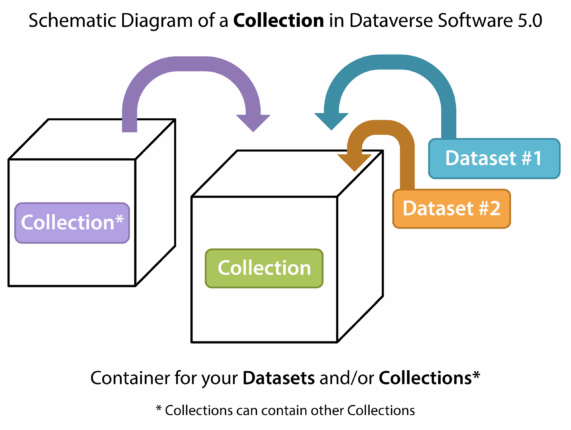
Each Collection contains datasets, and each dataset contains descriptive metadata and data files (including documentation and code that accompany the data). (Figure 2):
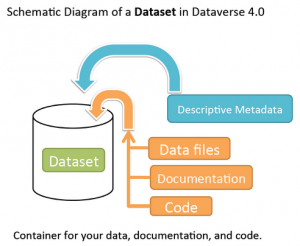
There is no cost for datasets unless specified in special conditions and restrictions. Access to data is mediated and thus requires a login and agreement to terms of use.
Steps in Accessing Data…
1 - FINDING STUDIES
To find data in the ADA collection, you can execute a search using the Dataverse search tool. You can conduct a search from the ADA Dataverse site, or using the search box in the upper right hand corner of this site. This will take you to ADA Dataverse.
![]()
Your search will return results for Dataverses, Datasets and Files.
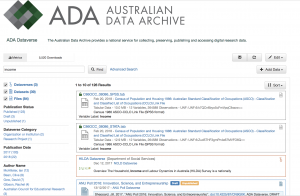
You can also perform an advanced search by key word, author or other metadata fields, as well as for variables, from the Dataverse Advanced Search page, or browse the ADA Dataverse catalogue directly.
For more detail on how to find data, see the Dataverse user guide “Finding and Using data”.
2 - VIEWING STUDY AND VARIABLE INFORMATION
Once you have located data you are interested in, you can find out more about the data by exploring the Dataset Page. See for example our Dataset page for the ANU Poll 2014 – Foreign Policy. Here you will find information organised into four tabs:
- Files: the files in the dataset, including data, documentation (such as questionnaires, reports and other information), and links to variable information
- Metadata: description of who conducted the study, data collection and methodology
- Terms: access conditions and terms of use
- Versions: details of the current version and any previous versions of the dataset
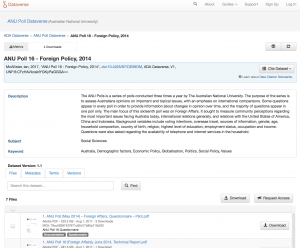
3 - DOWNLOADING DATA
To download open access data and documentation, click on the “Download” button next to the file you are interested in. Much of the data in the ADA collection has controlled access, denoted by a red lock icon next to the file. Files with controlled access require you to request access to the data, by clicking on the “Request Access” button.
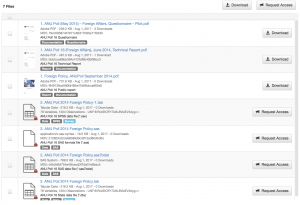
You can also request or download multiple files at a time by selecting multiple checkboxes, or the “Check All” checkbox at the top of the Files table.
Data Citation…
THE ADA RECOMMMENDED BIBLIOGRAPHIC CITATION
ADA has a standard bibliographic citation for all studies within our collection. Any publication, whether printed, electronic or broadcast, based wholly or in part on the data collections provided by the Australian Data Archive should be accompanied by the correct citation and acknowledgement information. A data citation in Dataverse has seven components:
- author name(s)
- year (date published in Dataverse)
- title
- global persistent identifier: DOI or Handle
- publisher (repository that published the dataset)
- version number
- universal numerical fingerprint (UNF): for tabular data
For example, the citation for the ANU Poll 2014 – Foreign Policy is:
McAllister, Ian, 2017, “ANU Poll 16 – Foreign Policy, 2014”, doi:10.4225/87/OE09OM, ADA Dataverse, V1, UNF:6:CFzHAl/kcaIdYGKyPaGGGA==
Details of the recommended citation are set out at the top of each ADA Dataset record, and can be downloaded in electronic format for use in your citation management software. You can see more detailed information about Dataverse’s Data Citation Standard at the Dataverse data citation page.
WHY CITE DATA?
Data citation enables you to recognise the academic contributions of those who have contributed and shared their data through the Australian Data Archive. The Australian Research Data Commons (ARDC) provides resources supporting why data citation is important: Citation and Identifiers.
The UK Data Service also provides a useful and brief summary of why data citation is important: Reasons to Cite Data Correctly.
DOIs IN DATA CITATION
ADA have introduced the use of Digital Object Identifiers (DOI) for data sets with their Dataverse platform. This ensures that even if the location of the data changes, the DOI will always link to the data that were used. These DOIs should also be included in the citation of the data.
How do DOIs help in supporting data citation? The ARDC describes how Identifiers assist in citation of dataset and software, and provide additional informational resources relating to the use of Identifiers in research: Citation and Identifiers
Access Conditions in ADA…
The Australian Data Archive is committed to providing open access to Australian and international research data for research and education purposes. This open access commitment however is balanced against our obligations to the original participants in these research studies. Data provided to the Australian Data Archive has been collected from research participants following research ethics requirements on the depositor who produced the data. These requirement place obligations on the researchers and ADA for appropriate use of the data for secondary purposes.
Access Categories
Data from the Australian Data Archive is made available under four broad categories of access. The choice of access category is made by the depositor of the data:
- OPEN ACCESS: studies where there are no restrictions on access
- GENERAL ACCESS: studies with controlled data access managed by the ADA on behalf of the depositor
- RESTRICTED ACCESS: studies where the depositor, or an authorised representative, wishes to be informed by the Archive of each request to use the data in order to give or withhold permission.
- SPECIAL ACCESS: studies where the depositor has included additional special access conditions. For example, the user may be required to obtain the permission in writing of the original depositor of the data, or an authorised representative, before publishing any interpretation of such materials.
Access to data at each of these levels has an associated user undertaking that you must complete in order to be granted access (see further below).
ADA Special Access Request Forms…
A number of the studies from the Australian Data Archive require a special request form to be completed. These forms, in conjunction with the ADA user undertakings, may form part of the data access process.
Copies of the special request forms are included below. If the form you require is not listed below, please contact the ADA at ada@ada.edu.au and we will make the form available to you.
A number of the studies provided by the ADA have specialised request forms that you will need to complete. These forms are then passed on to the data owners for review.
- Australian Longitudinal Study on Women’s Health – Online Application System
- Indonesian Data (Australian National University users only) – Application Form
- Longitudinal Survey of Australian Youth – Application Form and User Undertaking
- National Drug Strategy Household Survey – Application Form
- Negotiating the Life Course – Application Form
- Staff in Australia’s Schools – Application Form
- Ten to Men – the Australian Longitudinal Study on Male Health – Application Form and Data Use Agreement
- Young Minds Matter – Application Form
If the depositor of a dataset has specified that the data can only be supplied with their express permission, you will need to complete an Application to Access Restricted Data. Refer to the Terms section of a Dataset Page in the ADA Dataverse Catalogue to determine if a dataset is restricted.
ADA Undertaking Forms…
As part of our data access requirements, ADA may require that you complete a signed undertaking form before being approved to download data. These undertakings are to recognise the access conditions for your use of ADA data, and may include a request for information about your intended use of the data.
In general, approval to download data from restricted and special access studies will only be provided for staff members of research organisations, students conducting higher degrees by research and for other authorised research purposes.
Students may be required to provide additional information, including contact details of their supervisor in order to be approved for download access (online analysis of unrestricted data is available to all registered users).
There are two forms of undertaking, which relate to the access conditions under which the depositor provided the data to ADA:
If the depositor of a dataset has specified that the data can only be supplied with their express permission, you will need to complete an Application to Access Restricted Data. Refer to the Terms section of a Dataset Page in the ADA Dataverse Catalogue to determine if a dataset is restricted.
Certain depositors have required that access to their data include completion of a specialised User Undertaking form prior to the release of data. The ADA User Support staff will provide you with the relevant undertaking if this is required.





